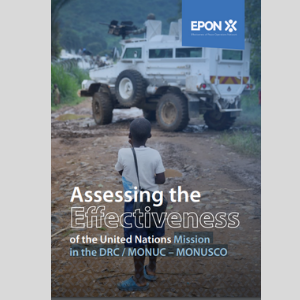Assessing the effectiveness of the United Nations Mission in the DRC / MONUC – MONUSCO
 The United Nations peacekeeping engagement in the DRC since the end of the Second Congo War has spanned nearly 20 years, three presidential elections, eight Special Representatives of the UN Secretary-General, and numerous political and security crises involving national and regional actors as well as non-state armed groups. The Mission has reinvented itself several times, tried to adapt to changing conflict dynamics, and had to shift its posture due to demands from the Security Council, the Congolese government and regional states, as well as in response to recent funding cuts.
The United Nations peacekeeping engagement in the DRC since the end of the Second Congo War has spanned nearly 20 years, three presidential elections, eight Special Representatives of the UN Secretary-General, and numerous political and security crises involving national and regional actors as well as non-state armed groups. The Mission has reinvented itself several times, tried to adapt to changing conflict dynamics, and had to shift its posture due to demands from the Security Council, the Congolese government and regional states, as well as in response to recent funding cuts.
Through this report, on behalf of the Effectiveness of Peace Operations Network (EPON), the authors identified four distinct phases: (1) the deployment into the crisis and the progressive growth of the Mission; (2) the support to the transitional government and to the organisation of general elections in 2006; (3) the post-transition phase that led to the establishment of a stabilisation mission; and (4) the creation of the FIB to fight the M23 and other designated armed groups, and to push towards new presidential elections as President Kabila’s second and last term was completed. We may even consider that 2019 marks the beginning of a fifth and perhaps final stage for the Mission, as it is burdened with the new challenge of supporting a Tshisekedi presidency with contested legitimacy and limited control over the key institutions of power, protecting an anxious and suspicious civilian population, and planning for its eventual drawdown and exit.
By adopting the EPON’s methodology framework, the report has evaluated the effectiveness of the UN peacekeeping efforts in the DRC across eight critical dimensions. A number of significant strategic and operational impacts and three constraints that have undermined UN efforts have also been identified.
Adriana Abdenur, Coordinator of the Peace & Security Division at Instituto Igarapé, co-authored the report.


